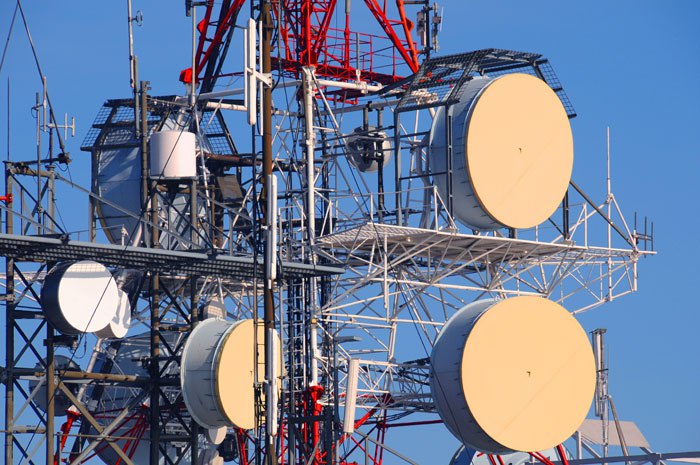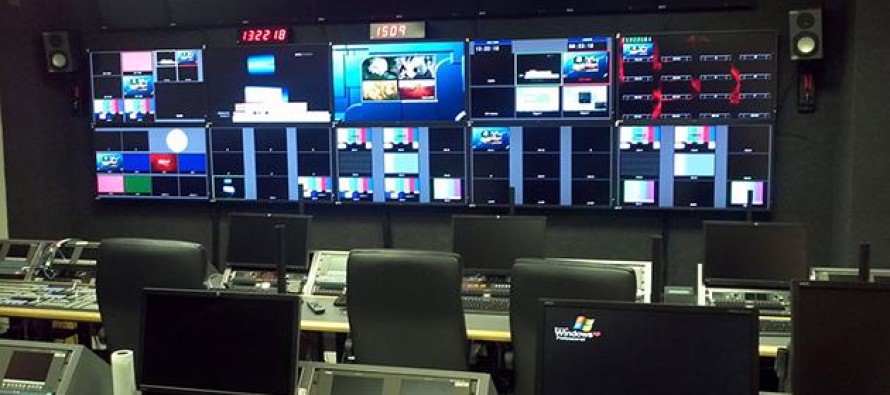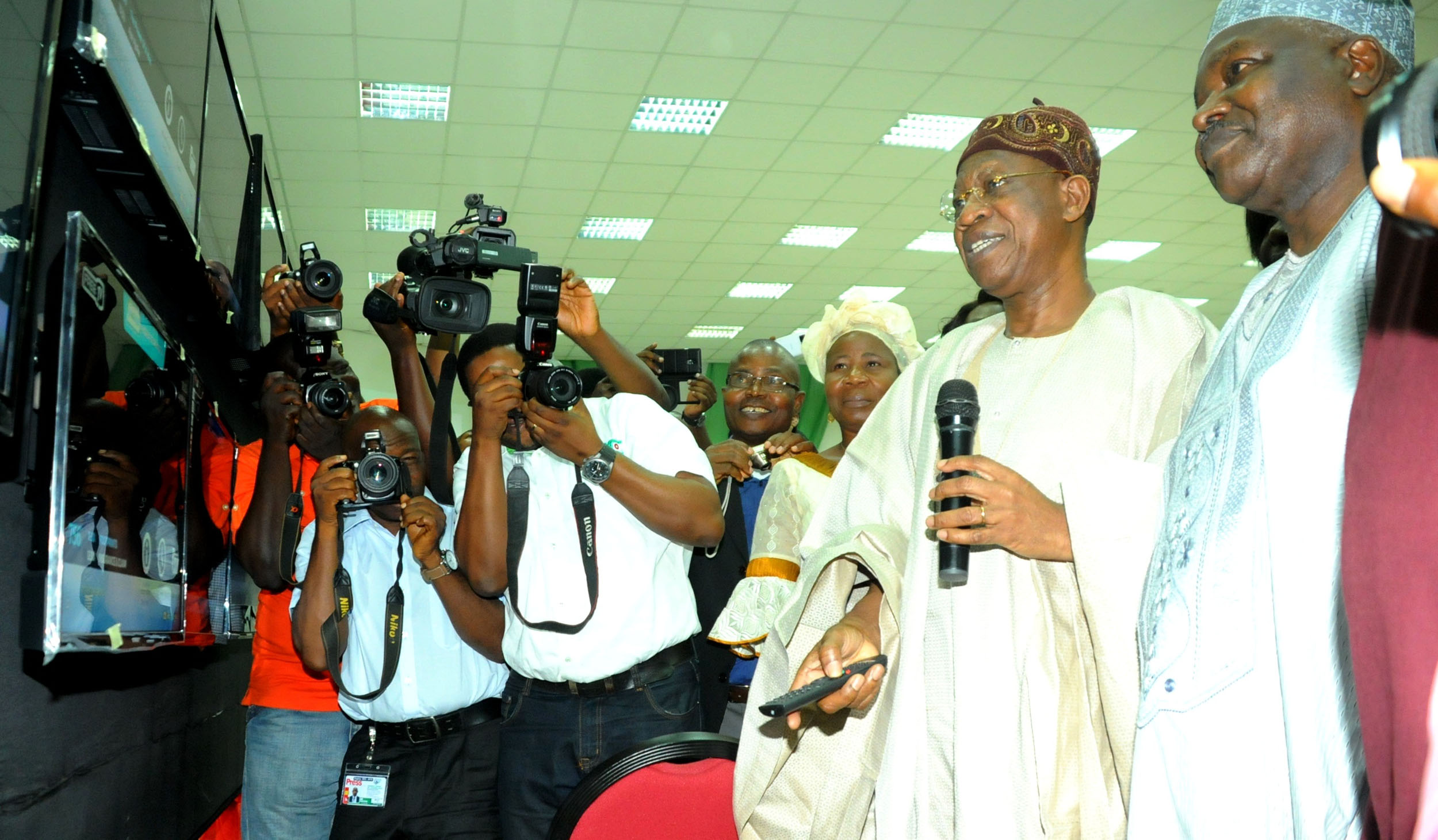Technology
Major Factors Delaying Digital Transition in Africa—Eutelsat

By Dipo Olowookere
For a while now, most African countries have found it very difficult to switch over from analogue broadcasting to digital.
Nigeria, which prides itself as the giant of Africa, has also not been able to fully switch over to digital broadcasting.
It is already two years now since the digital migration deadline set by the International Telecommunication Union (ITU) for Africa expired and yet only six African nations have completed digital transition.
Recall that in 2006, ITU, a UN agency, issued the Geneva 2006 agreement, signalling the development of ‘all-digital’ terrestrial television services.
The reason for this was to stimulate ICT applications and make more efficient use of spectrum through the digital dividend that comes with phasing out analogue TV.
Although the initial deadline, set for June 2015, was missed by most African countries, the digital revolution is nevertheless underway in a number of countries, including Algeria, Equatorial Guinea, Gabon, Ghana, Kenya, Nigeria, Rwanda, South Africa and Zimbabwe.
A recent report released by Eutelsat highlighted the major challenges delaying the digital transition in Africa.
According to the report, the main challenge to deploying nationwide Digital Terrestrial Television (DTT) is to manage timely and equitable switchover for everyone in order not to create a Digital Divide that separates the homes with digital from the homes left only with analogue.
The challenge, the report said, is particularly steep for countries with a large landmass, mountain ranges or islands that typically remain beyond range of terrestrial networks, or with interference issues in border regions.
Most terrestrial operators deploy fibre networks and DTT towers on the basis of return on investment, meaning they concentrate on areas with a certain population density and they neglect users in more rural or semi-rural areas. This means there is a real risk that exclusive use of terrestrial technologies can permanently leave too many consumers beyond range of the benefits of digital.
Eutelsat further said funding is another challenge, explaining that the cost of a nationwide DTT network is often underestimated and can put the break on switchover.
“The lack of attractive local content to fill up the channels that have been made available by DTT projects and funding for a public awareness campaign are also major setbacks that need to be overcome,” it added.
However, none of these issues need be a deal breaker. There are cost-effective and time-efficient solutions that can resolve the challenges, notably hybrid networks that use terrestrial as the basic platform and satellites to deliver channels to terrestrial towers and directly to homes beyond range of digital reception, the report pointed out.
The report said once the problems of cost, reach and speed of deployment are resolved, the challenges for any country preparing for digital transition will shift to managing the service, sourcing consumer hardware, set-top box distribution and content.
“In sharing our longstanding technical and commercial experience from working with public and private broadcasters, as well as regional governments around the world, Eutelsat can provide the most suitable satellite and best-in-class technical solution with the required expertise to drive the digitalisation process and contribute to the growth of a dynamic and lasting broadcast sector,” the report said.
It further explained that, in many regions C-band is the preferred choice for distributing content to terrestrial towers thanks to its resistance to rain fades. Ku-band has the advantage of enabling smaller dishes and is frequently used to complement terrestrial networks by Direct-to-Home (DTH) platform operators.
Two solutions are possible in combining DTT and DTH: hybrid solutions with C and Ku-band, using C-band for feeding towers and a DTH complement in Ku-band for homes in rural areas.
Alternatively, a single band solution, adopted notably in Zimbabwe, uses a single Ku-band transmission to feed towers as well as homes equipped with a Direct-to-Home dish.
On the benefit of digital transition, Eutelsat said, “The transition from analogue to digital TV is a logical development for the broadcasting industry, bringing significant advantages for all players across the value chain.
This, it said, include opportunity to transform the diversity, signal quality and reach of channels into viewer homes, opportunity to generate infrastructure upgrades and stimulate Africa’s vibrant content creation industry, and helps in the release of analogue frequencies for other applications such as mobile services.
“This is why private players like China’s pay-TV provider StarTimes, Canal + Overseas or MultiChoice are already establishing themselves as the continent’s key players in fast-tracking digital migration efforts,” it emphasised.
Founded in 1977, Eutelsat Communications is one of the world’s leading satellite operators. With a global fleet of satellites and associated ground infrastructure, Eutelsat enables clients across video, data, government, fixed and mobile broadband markets to communicate effectively to their customers, irrespective of their location.
Over 6,600 television channels operated by leading media groups are broadcast by Eutelsat to one billion viewers equipped for DTH reception or connected to terrestrial networks.
Headquartered in Paris, with offices and teleports around the globe, Eutelsat assembles 1,000 men and women from 32 countries who are dedicated to delivering the highest quality of service. Eutelsat Communications is listed on the Euronext Paris Stock Exchange.
Technology
Emergent Ventures, Others Invest $2.2m in Potpie

By Dipo Olowookere
About $2.2 million pre-seed round to help engineering teams unify context across their entire stack and make AI agents genuinely useful in complex software environments has been announced by Potpie.
Potpie was established by Aditi Kothari and Dhiren Mathur, who were determined to unify context across the entire engineering stack and enabling spec driven development.
As generative AI adoption accelerates, most tools focus on surface-level code generation while ignoring the deeper problem of context.
Large language models are powerful, but without access to system-level understanding, tooling history, and architectural intent, they struggle in real production environments.
Traditional approaches rely on senior engineers to manually hold this context together, a model that breaks down at scale and fails when AI agents are introduced.
The platform enables teams to automate high-impact and non-trivial use cases across the software development lifecycle, like debugging cross-service failures, maintaining and writing end-to-end tests, blast radius detection and system design.
It is designed for enterprise companies with large and complex codebases, starting at around one million lines of code and scaling to hundreds of millions.
Rather than acting as another coding assistant, Potpie builds a graphical representation of software systems, infers behaviour and patterns across modules, and creates structured artefacts that allow agents to operate consistently and safely.
A statement made available to Business Post on Monday revealed that the funding support came from Emergent Ventures, All In Capital, DeVC and Point One Capital.
The capital will be used to support early enterprise deployments, expand the engineering team, and continue building Potpie’s core context and agent infrastructure, it was disclosed.
“As AI makes code generation easier, the real challenge shifts to reasoning across massive, interconnected systems. Potpie is our answer to that shift, an ontology-first layer that helps enterprises truly understand and manage their software,” Kothari was quoted as saying in the disclosure.
A Managing Partner at Emergent Ventures, Anupam Rastogi, said, “In large enterprises, the real challenge is not generating code, it is understanding the system deeply enough to change it safely.
“Potpie’s ontology-first architecture, combined with rigorous context curation and spec-driven development, creates a structured model of the entire engineering ecosystem. This allows AI agents to reason across services, dependencies, tickets, and production signals with the clarity of a senior engineer. That is what makes Potpie uniquely capable of solving complex RCA, impact analysis, and high-risk feature work even in codebases exceeding 50 million lines.”
Technology
Expert Reveals Top Cyber Threats Organisations Will Encounter in 2026

By Adedapo Adesanya
Organisations in 2026 face a cybersecurity landscape markedly different from previous years, driven by rapid artificial intelligence adoption, entrenched remote work models, and increasingly interconnected digital systems, with experts warning that these shifts have expanded attack surfaces faster than many security teams can effectively monitor.
According to the World Economic Forum’s Global Cybersecurity Outlook 2026, AI-related vulnerabilities now rank among the most urgent concerns, with 87 per cent of cybersecurity professionals worldwide highlighting them as a top risk.
In a note shared with Business Post, Mr Danny Mitchell, Cybersecurity Writer at Heimdal, said artificial intelligence presents a “category shift” in cyber risk.
“Attackers are manipulating the logic systems that increasingly run critical business processes,” he explained, noting that AI models controlling loan decisions or infrastructure have become high-value targets. Machine learning systems can be poisoned with corrupted training data or manipulated through adversarial inputs, often without immediate detection.
Mr Mitchell also warned that AI-powered phishing and fraud are growing more sophisticated. Deepfake technology and advanced language models now produce convincing emails, voice calls and videos that evade traditional detection.
“The sophistication of modern phishing means organisations can no longer rely solely on employee awareness training,” he said, urging multi-channel verification for sensitive transactions.
Supply chain vulnerabilities remain another major threat. Modern software ecosystems rely on numerous vendors and open-source components, each representing a potential entry point.
“Most organisations lack complete visibility into their software supply chain,” Mr Mitchell said, adding that attackers frequently exploit trusted vendors or update mechanisms to bypass perimeter defences.
Meanwhile, unpatched software vulnerabilities continue to expose organisations to risk, as attackers use automated tools to scan for weaknesses within hours of public disclosure. Legacy systems and critical infrastructure are especially difficult to secure.
Ransomware operations have also evolved, with criminals spending weeks inside networks before launching attacks.
“Modern ransomware operations function like businesses,” Mitchell observed, employing double extortion tactics to maximise pressure on victims.
Mr Mitchell concluded that the common thread across 2026 threats is complexity, noting that organisations need to abandon the idea that they can defend against everything equally, as this approach spreads resources too thin and leaves critical assets exposed.
“You cannot protect what you don’t know exists,” he said, urging organisations to prioritise visibility, map dependencies, and focus resources on the most critical assets.
Technology
NCC Begins Review of National Telecommunications Policy After 26 Years

By Adedapo Adesanya
In a consultation paper released to the public, the commission said it is seeking input from stakeholders, including telecom operators, tech companies, legal experts, and the general public, on proposed revisions designed to reposition Nigeria’s telecommunications framework to match current digital demands. Submissions are expected by March 20, 2026.
The NTP 2000 marked a turning point in Nigeria’s telecom landscape. It replaced the 1998 policy, introducing full liberalisation and a unified regulatory framework under the NCC, and paved the way for the licensing of GSM operators such as MTN, Econet (now Airtel), and Globacom in 2001 and 2002.
Prior to the NTP, the sector was dominated by Nigerian Telecommunications Limited (NITEL), a government-owned monopoly plagued by obsolete equipment, low teledensity, and poor service. At the time, Nigeria had fewer than 400,000 telephone lines for the entire country.
However, the NCC noted that just as the 1998 policy was overtaken by global developments, the 2000 framework has become structurally misaligned with today’s telecom reality, which encompasses broadband, 5G networks, satellite internet, artificial intelligence, and a thriving digital economy worth billions of dollars.
“The rapid pace of technological change and emerging digital services necessitate a comprehensive update to ensure the policy continues to support economic growth while protecting critical infrastructure,” the Commission stated.
The review will target multiple chapters of the policy. Key revisions include: Enhancements on online safety, content moderation, digital services regulation, and improved internet exchange protocols; a modern framework for satellite harmonisation, coexistence with terrestrial networks, and clearer spectrum allocation to boost service quality, and policies to address fiscal support, reduce multiple taxation, and lower operational costs for operators.
The NCC is also proposing entirely new sections to the policy to address emerging priorities. Among the key initiatives are clear broadband objectives aimed at achieving 70 per cent national broadband penetration, with a focus on extending connectivity beyond urban centres to reach rural communities.
The review also seeks to formally recognise telecom infrastructure, including fibre optic cables and network masts, as Critical National Infrastructure to prevent vandalism and enhance security.
In addition, the commission is targeting the harmonisation of Right-of-Way charges across federal, state, and local governments, alongside the introduction of a one-stop permitting process for telecom deployment, designed to reduce bureaucratic delays and lower operational costs for operators.
According to the NCC, the review aims to make fast and affordable internet widely accessible. “The old framework was largely voice-centric. Today, data is the currency of the digital economy,” the commission said, highlighting the need to close the urban-rural broadband divide.
The consultation process is intended to gather diverse perspectives to ensure the updated policy reflects current technological trends, market realities, and consumer needs. By doing so, the NCC hopes to maintain the telecommunications sector’s role as a key driver of economic growth and digital inclusion.
-

 Feature/OPED6 years ago
Feature/OPED6 years agoDavos was Different this year
-
Travel/Tourism10 years ago
Lagos Seals Western Lodge Hotel In Ikorodu
-

 Showbiz3 years ago
Showbiz3 years agoEstranged Lover Releases Videos of Empress Njamah Bathing
-

 Banking8 years ago
Banking8 years agoSort Codes of GTBank Branches in Nigeria
-

 Economy3 years ago
Economy3 years agoSubsidy Removal: CNG at N130 Per Litre Cheaper Than Petrol—IPMAN
-

 Banking3 years ago
Banking3 years agoSort Codes of UBA Branches in Nigeria
-

 Banking3 years ago
Banking3 years agoFirst Bank Announces Planned Downtime
-

 Sports3 years ago
Sports3 years agoHighest Paid Nigerian Footballer – How Much Do Nigerian Footballers Earn
















